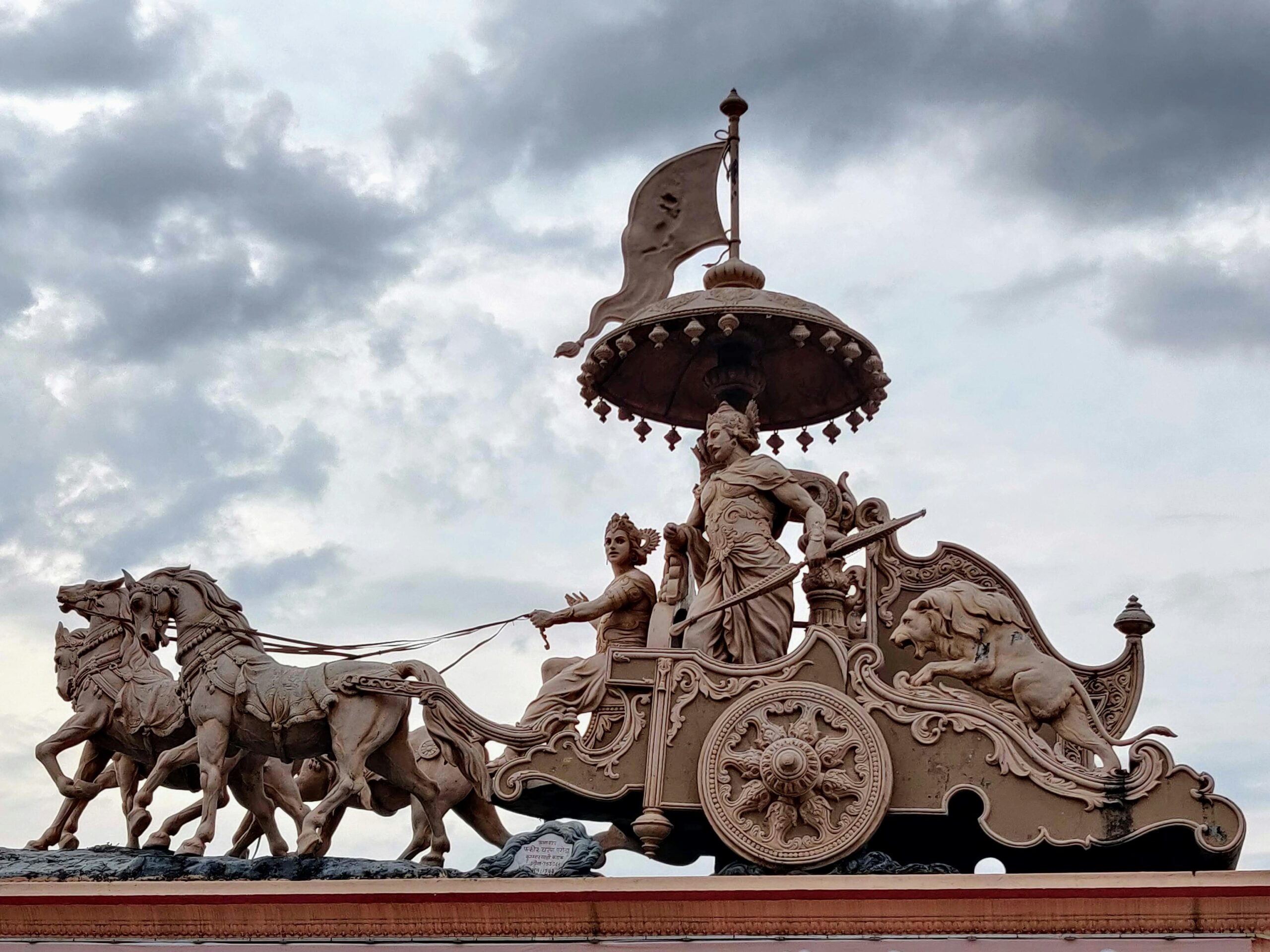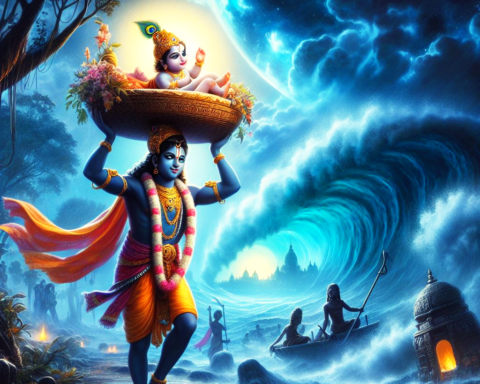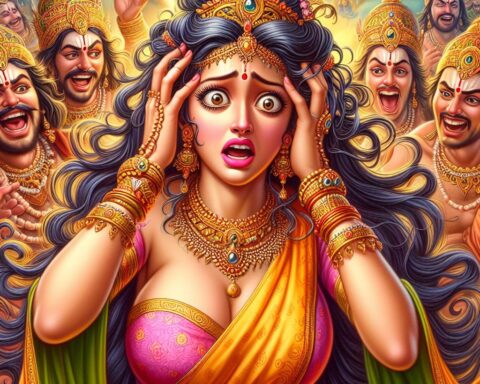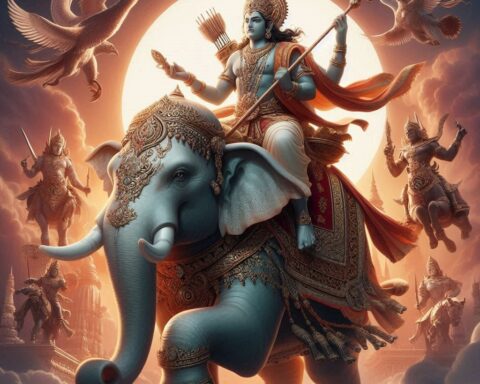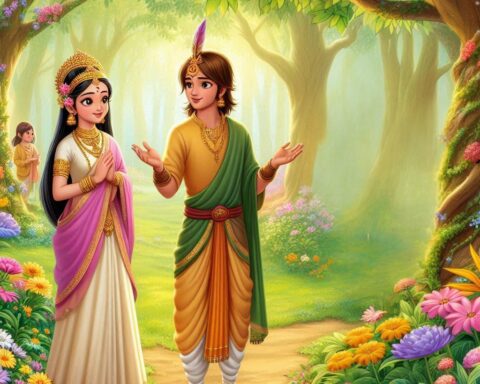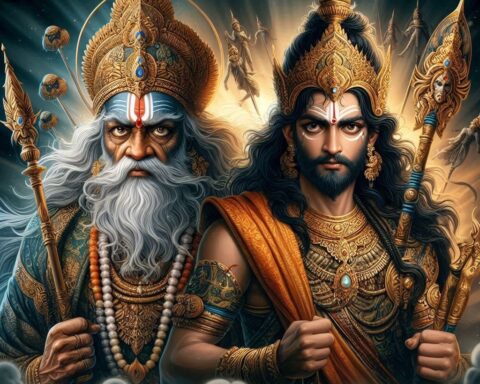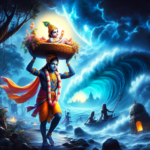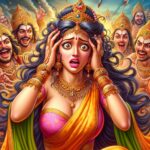What Happened in Indra’s Court
King Indra’s court was at its resplendent best. The floors and walls shone like mirrors reflecting light from the dazzling jewels and colourful garments worn by the gods, goddesses, and illustrious invitees of the human world gathered there.
The ceiling was the open, dark sky decorated with millions of stars twinkling merrily around the luminous moon both vying for attention with the floors and walls in beauty and splendour. King Indra’s throne was made of glittering gold and embellished with rubies, emeralds, pearls, and all sorts of precious and semi-precious stones. He was dressed in the best of silks and wore jewels that dazzled the eyes of onlookers.
He sat on a raised platform at the eastern end of his vast courtroom. The others were seated on smaller but elegantly decorated gold and silver thrones placed in two symmetrical rows on either side of the raised platform. The graceful and glorious Apsaras were performing a mesmerizing and magically alluring dance recital in the centre of the court.
Everyone present was engrossed in the magnificent dance recital; except King Mahibushan and Ganga who had eyes only for each other. It was love at first sight. They were blind to everything and everyone around them. They were so engrossed in one other’s love-filled gaze that Ganga did not even notice her upper garment fly away in the wind and partially expose her bosom.
“Ganga!”
Startled out of her romantic reverie by the raspy, angry voice of her father, Lord Brahma, Ganga looked around to see everyone present had their heads bowed except King Mahibushan who was now looking at her father. The look in his eyes had changed from love to dread. Realizing her folly, Ganga quickly recovered her garment lying a few feet away and covered her bosom. Her contrite face hung in shame.
Her father’s eyes blazed in anger. He hurled a curse at her, “As your desire for a human being is deep, go and live among them.”
Aghast, Ganga pleaded with her father for mercy. She and King Mahibushan fell at his feet, apologized profusely and begged for forgiveness. He relented after a while and said, “Your curse will break when you are forced to reveal your true identity to the man you marry on earth.”
It was Ganga’s turn to be angry. She was angry at King Mahibushan for distracting her, She was angry at herself for losing control. And she was angry at her father for making such a big thing about a small oversight.
But she knew her rage-filled sadness was unproductive and she could not avoid the sentence. She dreaded living among weak and sad human beings.
******************************************
The Eight Vasus
The eight Vasus, important elemental gods of the heavenly world, hung their heads in shame. Collectively known as Ashta Vasus, they held a place of pride in the heavens. And yet, they had behaved immaturely and had rightfully earned the curse of Sage Vasistha.
The youngest Vasu, Prabhasa, the elemental god of the Nakshatras, spoke up, his eyes filled with remorseful tears, “Oh Mighty Goddess! I plead on behalf of myself and my seven elder brothers. Free us from Sage Vasishtha’s curse.”
“We have learned our lesson well. It was my fault to have given heed to my wife’s naive desire to capture the revered rishi’s sacred cow, Kamadhenu. My brothers only helped me out of their love for me. We deserve to pay the price of his holy wrath. The rishi has sentenced us to earth. Allow us to be born as your children and release us immediately after our birth.”
Ganga agreed to carry the eight brothers in her womb and help them complete the curse. Moreover, this task gave her a sense of purpose for her earthly mission.
************************************
Ganga and Shantanu
Ganga emerged as a beautiful woman out of the waters she controlled. Droplets of crystal clear water joined together from the middle of the gently flowing river. As the droplets moved towards the bank, they slowly took the shape of a lady. By the time, the stream of droplets reached the bank, they were fully transformed into a gorgeous woman. It was time for her earthly sentence to start.
She hid behind the thick bushes waiting for him to show up at the river bank for his morning ablutions. Ganga inhaled sharply as she caught a glimpse of his handsome face and beautifully toned body that showed off rippling muscles at all the right places. The power and strength of his physique the sound of the roaring river ahead. Ganga’s memory of seeing this man in his previous birth was fresh even today.
King Mahibushan was reborn as King Shantanu, the 12th king in the Kuru Clan which started with the illustrious Bharata after whom our country is named. Looking at King Shantanu seemed to dent her desire to return to her heavenly abode. Putting aside these thoughts, she set forth to keep her promise.
She came out from the shadows and walked gracefully towards King Shantanu. As expected, Shantanu was mesmerized by her stunning beauty. They passed each other without exchanging a word. But she knew the spark of desire was lit. Every morning for the next couple of days, they walked past each other, and each time the desire in Shantanu’s heart for her increased steadily.
Finally, he found the courage to approach her. Getting right to the point, the king said, “I don’t know who you are. But I’m hopelessly in love with you. Will you marry me?” She was prepared for this question. After all, this was the reason for her human form. She wanted to marry him, fulfil both their desires, and make him force her to reveal her true identity so she could go back home.
She said, “I will if you agree to two conditions.” King Shantanu was a powerful emperor. He thought what could she ask that he cannot fulfill? So he promised, “I’ll agree to anything you want.”
She replied, “You must not ask me about my past and who I am. And you must not question my actions, no matter how bizarre. If you do so, I will leave you forever.” Thinking that these were simple and easy conditions, and overcome by his desire for her, King Shantanu readily agreed.
They were married and lived together happily at Hastinapur, the prosperous capital of the Kuru Empire. Time passed and Shantanu’s wife delivered their first child. While the entire kingdom rejoiced at the birth of the kingdom’s heir, she did something cruelly outlandish. She took her newborn baby to the banks of River Ganga and drowned him in the swirling waters.
Shantanu was shocked and aghast. But he was bound by his promise to her. Shantanu could do nothing but watch helplessly as his wife drowned six more of his sons in River Ganga. He was torturously torn between his love for his wife and the deep desire to save his sons.
Each time a son of his was drowned mercilessly in the ferocious river, King Shantanu’s heart broke into a million pieces and his love for his wife abated little by little, slowly being replaced with hatred and anger. When he saw his seventh child meet the same cruel fate, he decided he would do anything to prevent the next child from death, come what may!
When the eighth son was born to them, he could not control himself any longer. He asked her, “How can a mother be so cruel as to murder every newborn child of hers? Who are you?”
His wife looked at him, her face forlorn, and her eyes brimming with unshed tears. “Alas, my dear husband! I wish you had held on to your patience for a little more, and then we would have been together for a long, long time, bringing up this wonderful son who would be the Scion of the Kuru family. Now, all is lost. And I have to leave you.”
Shantanu was now filled with a new dread. He pleaded with his wife, “No! No! Don’t go away. Forgive me for my hasty attitude. Stay and be with me forever.”
“I’m afraid it’s too late for that now, my dear husband. But let me remind you of our story before I leave. I am Ganga, the Goddess of this river. And you were King Mahibushan, a close of King Indra, in your previous birth.” She narrated the entire story of how her father cursed her in King Indra’s court.
“But what about our children? Why did you have to kill them?” Asked Shantanu.
“They were the eight Vasus cursed by Sage Vasishtha for their naive and immature behaviour. All except this child were allowed to return to their heavenly abode as soon as they were born. I was only helping them complete their earthly sentence.”
She continued, “When I was sentenced to the human world, I rebelled against it. But living as your wife, I realized the life of human beings is beautiful, filled with a variety of emotions that drive, motivate, and spread happiness and joy, and yes sometimes, sadness too. I am so much in love with you and your kingdom now that I don’t want to go back to my heavenly abode. But I have no choice. My curse is broken and I have to return.”
“I’m taking our son back to the heavens where he will get all the training and education needed for him to fulfil his destiny of an illustrious warrior on earth. I shall return him to you when he is ready.”
The royal couple bid a tearful farewell to each other and Ganga returned to her home in the heavens with Devavrat, their eighth son. As she looked with love at her baby, Ganga recalled the remorse-filled face of Prabhasa. He had unhesitatingly sacrificed himself for the sake of his beloved brothers. Prabhasa had pleaded with Sage Vasistha to spare them and transfer the burden of their collective mistake to him alone.
The holy seer had agreed and allowed all seven of them to return home as soon as they took human form. The wise sage had said to Prabhasa, “In return for your sacrifice for your siblings, your life on earth would be long and illustrious. Your work will be remembered for aeons after your time.”
Ganga noticed he hadn’t said anything about happiness, love, joy, and companionship; the most beautiful elements of human life. She had no doubt that the holy seer’s words would not be in vain. Devavrat would be the backbone of the Kuru clan and would hold it together for three generations before he would be freed to return home.
But as a mother, Ganga wanted the joy and happiness she experienced on earth for her son too. But her heart told her, as she gazed into his smiling face, that happiness was the one thing that would elude her child.
Ganga wished she hadn’t agreed to become a mother to the eight Vasus. She realized how agonizingly difficult motherhood was. The most painful part of her father’s curse was beginning only now. Yet, she also realized that of all the beautiful things on earth, becoming a mother came right on top. It was simultaneously beautiful and challenging to be a mother, to balance love and discipline on a fragile scale of emotions.
Thus, Devavrat who would later become Bhishma, “the one of the terrible vow,” was born into the Kuru clan to become an epitome of sacrifice, thanks to the karmic intertwining of two seemingly unrelated events, and set the stage for the mighty Mahabharata.
Photo by Anshuman Abhishek on Unsplash

